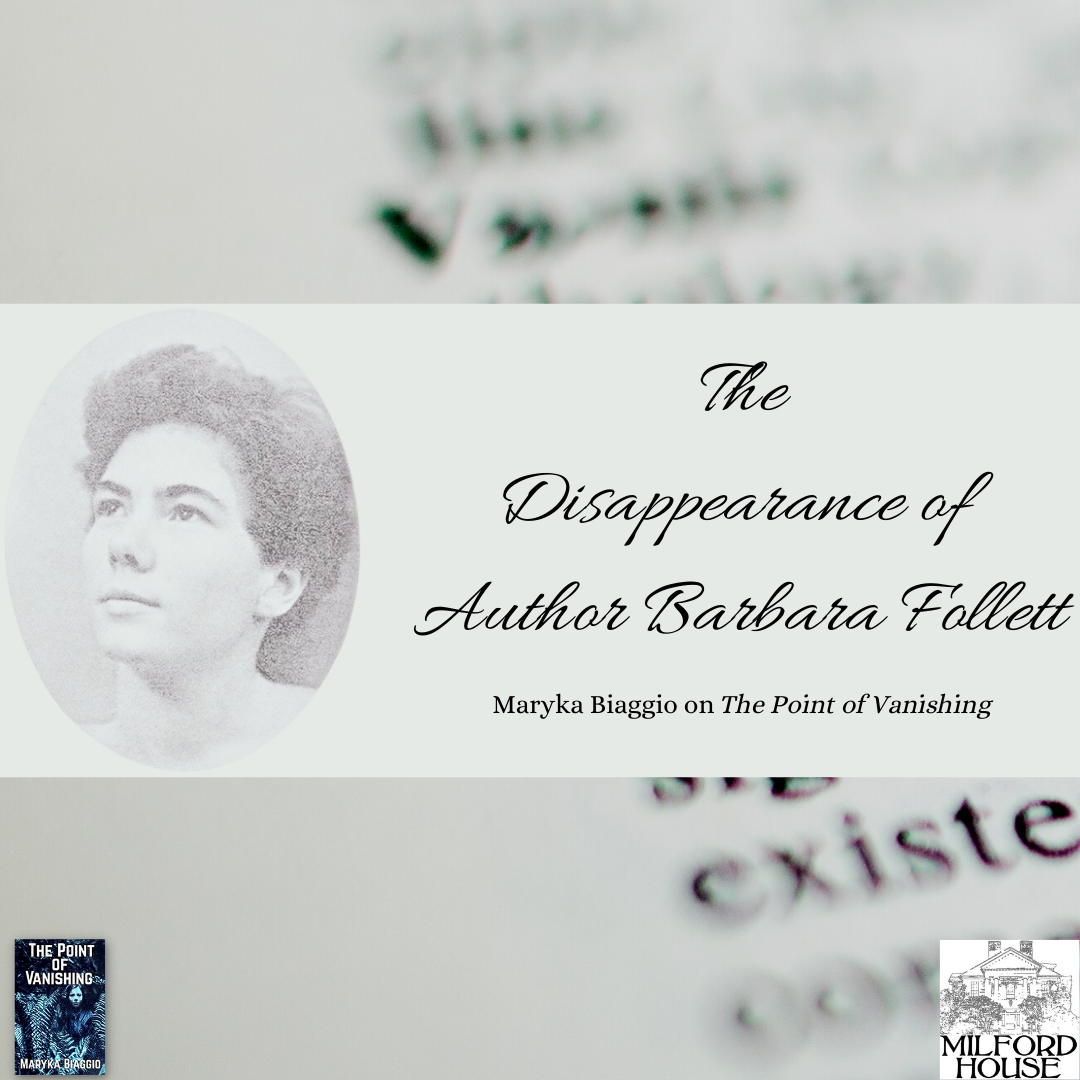
Prodigy author Barbara Follett walked out of her apartment in 1939, and she was never seen again. What happened?
When historical novelist Maryka Biaggio stumbled across the story of child prodigy writer Barbara Follett in 2011, she knew she had to write a novel about her—an account that would make sense of her enigmatic life. But she didn’t know that would lead to years of research and lingering questions.
Young Barbara Follett, born in Hanover, New Hampshire, in 1914, had all the makings of fame and success.
Her mother gave up a teaching career to school her at home—because both parents agreed no ordinary school could serve her dazzling intellect. Her father, Wilson Follett, author of the classic Modern American Usage, encouraged her nascent writing skills.
By age four she knew how to type, and when she was twelve, she published a fantasy/adventure novel, The House Without Windows, to great acclaim. In 1928, she followed up with publication of a charming account of her journey on a square-rigger, The Voyage of the Norman D.

Then tragedy struck the family, and Barbara’s life changed irrevocably.
Yes, she had more adventures—journeying halfway around the world with her mother and trekking Europe with her husband to be—sometimes courting danger. But some soul-squelching wound haunted her, and never again did she find publishing success.
At the age of twenty-five, Barbara Follett walked out on her husband. To this day, her disappearance remains a mystery.
Months after her disappearance, a police report was filed, but the police uncovered no clues as to her whereabouts. Her mother undertook an investigation of her own, tracking down anybody and everybody who’d had contact with Barbara before her disappearance, but to no avail. Before long, the trail went cold.
Did Barbara, like her protagonist in The House Without Windows, escape to some wild retreat? Could a young woman of such vibrancy commit suicide? Was it possible she was the victim of foul play?
Biaggio, a clinical psychologist turned novelist, set out to explore Barbara Follett’s life and writings in an attempt to understand what happened that fateful night in 1939. And there was plenty of material to read and evaluate.
In 1960 Barbara’s mother, Helen Follett, approached Harold Grier McCurdy, an expert on childhood genius, offering to turn over letters, prose, and poetry by Barbara. McCurdy agreed to study Barbara’s history and books, which led to a five-year collaboration and publication of Barbara: The Unconscious Autobiography of a Child Genius in 1966.
It is a fascinating read since it offers a psychological analysis of Barbara’s stories, starting with short stories written when she was quite young, and culminating in her unpublished novel Lost Island. It offers, in McCurdy’s words, “the unfolding of a quite individual drama.” Still, it shies away from asking the hard questions, perhaps out of deference to a mother’s pain over her lost daughter.
That left Biaggio to do her own research.
Before her death in 1970, Helen Follett donated all Barbara’s materials to Columbia University. Housed in their library archives are boxes of materials—letters, drawings, newspaper clippings, photographs, and unpublished stories and poems.
It took Biaggio two visits and many hours to catalog, scan, and review the collection. Digesting it all took many more months, and fashioning Barbara’s story into a novel turned into a seven-year effort. While Barbara was at once fragile and daring, brilliant and awkward, she lived a life full of soaring twists and tragic turns. So any novel about her had to reflect not only drama of her life, but the agony of her sorrows, too.
Does Biaggio solve the mystery of Barbara’s disappearance?
She cannot claim to know for certain what happened to Barbara in 1939, but, yes, she does offer her own conclusion. Still, it is for the reader to decide, after undertaking the novelistic glimpse of Barbara’s fascinating life story in The Point of Vanishing.
About the Author

Maryka Biaggio, Ph.D., is a former psychology professor turned novelist who specializes in historical fiction based on real people. She enjoys the challenge of starting with actual historical figures and dramatizing their lives—figuring out what motivated them to behave as they did, studying how the cultural and historical context may have influenced them, and recreating some sense of their emotional world through dialogue and action. Doubleday published her debut novel, PARLOR GAMES, in January 2013, and Sunbury Press published Eden Waits in 2019 and The Point of Vanishing in 2021. She lives in Portland, Oregon, that edgy green gem of the Pacific Northwest. Learn more at marykabiaggio.com.
Buy the Book
Stay tuned for more from Sunbury Press!
Thanks for checking out this blog post about the disappearance of author Barbara Follett! Sunbury Press has over 1,000 titles to choose from--the best in fiction and nonfiction through various imprints--and we love helping readers find their next favorite book. If you liked what you read, check out more of our blog posts or full collection.


